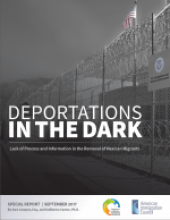Deportations in the Dark: Lack of Process and Information in the Removal of Mexican Migrants
This report is based on the testimonies of 600 migrants who were deported from the United States to Mexico between August 2016 and April 2017. Those interviewed pointed towards systematic failures to follow established procedures for detention and deportation. For example, 43.5 percent of interviewees reported that they were not informed of their right to contact their consulate, and more than half (55.7 percent) were not asked if they feared returning home – a key element of applying for asylum. Once the process started, half (50.7 percent) indicated they were forced to sign legal documents without getting a chance to review them, and more than half (57.6 percent) were not given their repatriation documents – necessary for legal readmission to their home countries. In addition, many of those interviewed (23.5 percent) reported being mistreated during their apprehension, including physical and verbal abuse. Respondents also recalled inhumane conditions while being held, including exposure to freezing temperatures. Despite the prevalence of abuse, the authors report that for 95 percent of the 1,255 complaints lodged with Customs and Border Patrol (CBP) no action was taken. The authors believe that as the current administration deports more migrants it is likely that their rights will be increasingly under attack. Following the administration’s lead, CBP agents may feel empowered to make the detention and deportation environment even more hostile to migrants. In particular, the move to expediting deportations may increase the risk that CBP officers will not follow existing protocols, putting asylum seekers lives at risk and breaking up US-based families. (Erik Jacobson, Montclair State University)
Campos, S., & Cantor, G. (2017). Deportations in the Dark: Lack of Process and Information in the Removal of Mexican Migrants (p. 24). Washington, D.C.: American Immigration Council, Binational Defense and Advocacy Program. Retrieved from https://www.americanimmigrationcouncil.org/research/deportations-dark

